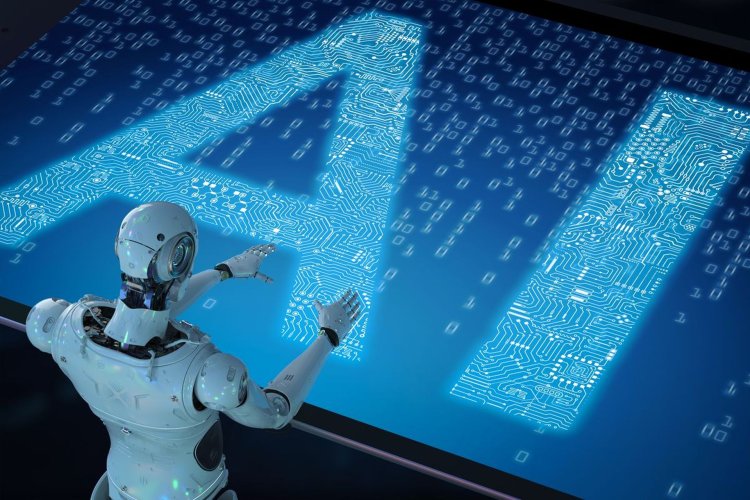6 Incredible Advancements In Artificial Intelligence Technology
Discover the power of smart laptops with advanced AI features, designed to enhance productivity, efficiency, and seamless multitasking.

Have you ever wondered how artificial intelligence is shaping our future? AI is transforming nearly every industry, from virtual assistants like Siri to self-driving cars.
But what exactly makes these technologies so revolutionary? How are they evolving, and what new advancements are on the horizon?
As AI continues to break barriers, we witness incredible feats that were once the stuff of science fiction.
For your information, AI is projected to contribute $15.7 trillion to the global economy by 2030.
Let's dive into six remarkable advancements in AI that are not only changing the way we live but also pushing the limits of what's possible in technology:
1. AI In Healthcare: Revolutionizing Diagnosis And Treatment
AI is making significant strides in healthcare, particularly in diagnosing diseases and recommending treatment options. Machine learning models can now accurately analyze medical images, sometimes outperforming human doctors.
WHO envisions a future in which AI is a powerful force for innovation, equity, and ethical integrity in healthcare.
Similarly, smart laptops with AI features are transforming industries, enabling professionals to work more efficiently and make better-informed decisions. These advancements are helping improve productivity and outcomes across various sectors.
Key Areas of Impact:
-
Medical Imaging: AI tools can identify diseases like cancer, heart conditions, and neurological disorders by analyzing X-rays, MRIs, and CT scans.
-
Personalized Medicine: AI algorithms use patient data to recommend personalized treatments that are more effective than traditional one-size-fits-all approaches.
2. Natural Language Processing: Improving Communication And Efficiency
Have you ever spoken to a chatbot that feels almost human? Natural Language Processing (NLP) is behind those conversations. NLP allows machines to understand and respond to human language, making communication more seamless and natural.
This is why the market size is expected to show an annual growth rate (CAGR 2025-2030) of 26.55%, resulting in a market volume of US$156.80bn by 2030.
-
Voice Assistants: From Siri to Alexa, voice recognition has drastically improved, enabling users to interact with technology more effortlessly.
-
Language Translation: AI-driven translation tools can now provide real-time, accurate translations, breaking down language barriers in business and personal communication.
AI in Text and Speech Recognition
Advanced AI algorithms can now transcribe speech into text with near-perfect accuracy. This has vast implications for industries like journalism, law, and customer service, where transcription services are in high demand.
3. Autonomous Vehicles: The Future Of Transportation
Self-driving cars have long been considered a futuristic concept, but they are becoming a reality thanks to AI. Autonomous vehicles (AVs) are equipped with AI-powered sensors, cameras, and algorithms that allow them to navigate roads, recognize obstacles, and make real-time decisions.
The US autonomous vehicle market is expected to grow from $22.52 billion in 2023 to $78.63 billion by 2030.
How It Works:
-
Sensor Fusion: AI integrates data from various sensors (radar, LiDAR, cameras) to comprehensively understand the vehicle’s surroundings.
-
Deep Learning: AI systems use deep learning techniques to analyze patterns in data, enabling cars to recognize pedestrians, traffic signs, and other vehicles.
4. AI In Creativity: From Art To Music
AI isn’t just about logic and data; it’s also making its mark in the creative world. Algorithms can create stunning art, compose music, and even write poetry. AI can mimic styles and generate new, original pieces by analyzing thousands of artistic works.
-
Art Generation: AI tools like DeepArt can take a simple photo and transform it into a work of art in the style of famous painters.
-
Music Composition: AI-driven platforms like Jukedeck and Aiva can compose original pieces of music across various genres, from classical to electronic.
While AI-generated art and music are impressive, they also raise questions about authorship and originality. Who owns the rights to a piece created by an AI? The creative community is still grappling with these questions.
5. AI In Cybersecurity: Strengthening Defense Mechanisms
As cyber threats grow in sophistication, AI is stepping in to protect our digital infrastructure. AI-powered security systems can detect and neutralize threats faster than traditional methods.
-
Threat Detection: AI systems can analyze network traffic in real-time, identifying unusual behavior patterns that may indicate a cyberattack.
-
Automated Response: In case of a detected threat, AI can autonomously deploy countermeasures, such as isolating affected systems, preventing data loss, and stopping attacks in their tracks.
The Role of Machine Learning in Cybersecurity
Machine learning allows cybersecurity systems to learn from previous attacks, continuously improving their ability to identify new threats. This enables faster, more effective responses to ever-evolving cyber risks.
6. AI-Powered Robotics: Revolutionizing Manufacturing And Service Industries
Robots powered by AI can now perform complex tasks with precision and adaptability, revolutionizing manufacturing and service industries. These robots are no longer just programmed to follow simple instructions—they can learn from their experiences and improve over time.
Key Applications:
-
Automated Manufacturing: AI robots assemble products, manage inventory, and even conduct factory quality control inspections.
-
Service Robots: In customer service, AI-driven smart laptops can interact with customers, answer questions, and even provide personalized recommendations.
Collaborative Robots (Cobots) in the Workforce
Cobots, designed to work alongside humans, enhance productivity in factories and warehouses. These robots perform repetitive or dangerous tasks, allowing human workers to focus on higher-level functions.
Conclusion:
Artificial intelligence is undeniably transforming every corner of our world, from healthcare and transportation to the environment and creativity. These advancements are not just reshaping industries—improving lives, creating new opportunities, and presenting exciting possibilities for the future. As AI continues to evolve, one thing is clear: the next big leap is just around the corner, and it will be nothing short of extraordinary.
What's Your Reaction?

















